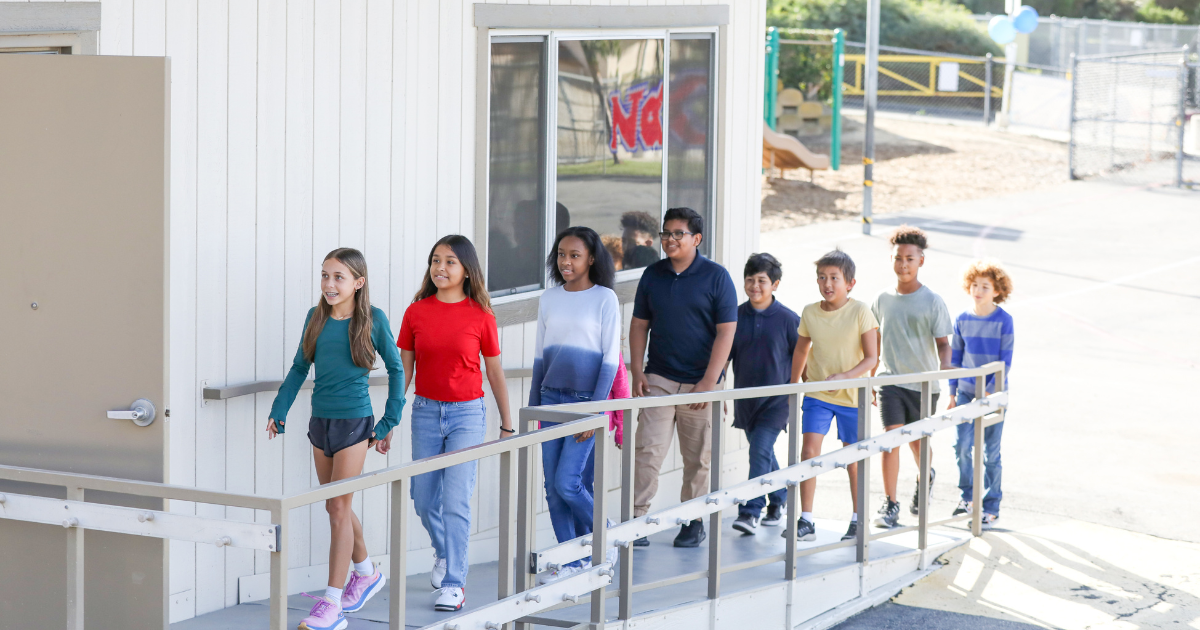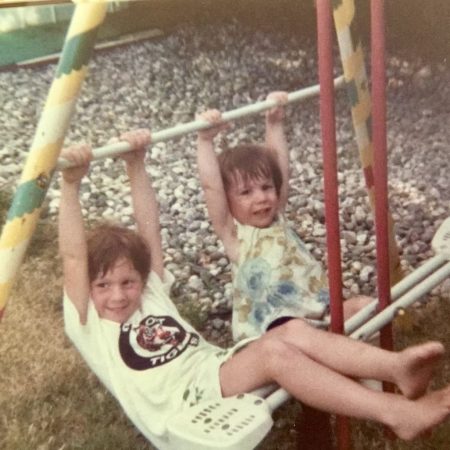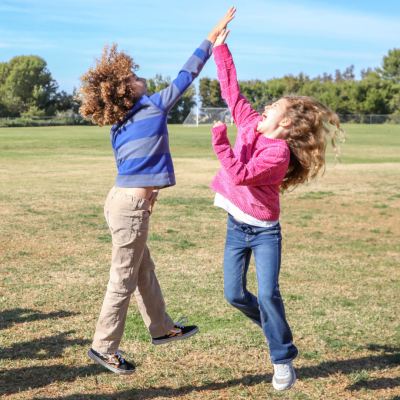
By Dr. Kristen Henry, Vice President, Curriculum & Training
It’s the Most Wonderful Time of the Year?
My Tale of the Back to School Blues
In the story of my childhood, there are two protagonists in the “Back to School” chapter: Jenny and Krissy. These polar opposite sisters shared DNA, gender, race, ethnicity, and homelife, yet they lived very different realities- in particular when it was time to go back to school.
At the end of each summer, my big sister, Jenny, counted down the days to her joyous reunion at school on the first Wednesday after Labor Day. She carefully curated her identity for the year ahead; selecting the perfect new lunchbox and determining her signature color for folders (One for each subject- of course!). She dreamed of her new teacher, where her seat would be assigned (Please, right next to the teacher!), and of her friends – the ones with whom she would reunite and those she had yet to meet.
Krissy (that’s me!) also experienced anticipation, but rather than the blinding optimism of my sister, my felt sense was absolute, existential dread. I became physically ill when I saw the premature arrival of the school supplies at the stores (my hands are clammy just typing about it!) and I spent many Augusts and Septembers mastering the art of avoidance and wishing I didn’t exist. I practiced being invisible to the adults at school and in my afterschool program. In fact, some would say I perfected it.

But my experience wasn’t unique, actually, in the wake of the introduction of smartphones and social media and most recently, the pandemic, the number of “Krissys” are on the rise. Symptoms of anxiety and depression among children and adolescents surged during the pandemic, with a significant portion of students developing school avoidance behaviors (Racine et al., 2021) and nearly 20% of students exhibiting some form of school refusal, a sharp increase from pre-pandemic levels (Lyon et al., 2022). This trend is especially concerning, as prolonged school avoidance can lead to academic decline, social isolation, and long-term mental health challenges.
Okay. We get it. Not everyone is like Jenny and we’re living in a world where the Krissys are multiplying. But what can we do?
At Elevo, our mission is to transform the well-being of students, so they look forward to coming to school. Our programs and staff training are designed with the current conditions in mind. Leveraging the Science of Learning and Development, we’ve prioritized the development of relationships and belonging to provide unique learning experiences for ALL students. But, in order to share that with them, they might need support to arrive.
Here are five tips, supported by the science of well-being for families and educators if your child, or someone you know is getting nervous about going back to school.
1. Recognize the Signs of Anxiety and School Avoidance
Research Insight: Early identification of anxiety and school avoidance behaviors is crucial and early intervention can prevent these issues from escalating to mental health issues (Elliot & Place, 2019).
Tip: Parents and educators should be vigilant for signs of anxiety, such as frequent complaints of physical symptoms (e.g., headaches, stomachaches), withdrawal, reluctance to go to school, or sudden changes in behavior. Rely not only on classroom teachers, but other school staff like before and after school providers to keep you connected.
2. Foster a Supportive and Open Environment
Research Insight: Students who felt supported by school staff and peers were less likely to develop school avoidance behaviors (Thapa et al., 2013).
Tip: Encourage open communication by regularly checking in with students about their feelings. Elevo coaches are trained on evidence-based strategies to develop communication and foster secure relationships. From a Warm Welcome to Community Circles, our staff prioritize a sense of belonging where each child feels welcome and safe.
3. Gradually Reintegrate Students into School Routines
Research Insight: Graded exposure therapy, where students are gradually reintroduced to school-related activities, is an effective approach to reducing school avoidance (Kearney & Albano, 2004).
Tip: Start with small steps, such as visiting the school, meeting teachers, or participating in school-related activities before the official start of the school year. Plan backwards with your child to build up to the first day. For younger students, take pictures of your child in the new environment and create a social story to read with them. Providing clarity about what the day will look like reduces the unknown; when they know the plan, they’re less likely to fill in the blank space with their fears of what may be.
4. Promote Social Connections
Research Insight: Strong peer relationships can buffer against anxiety and promote school attachment (Wentzel & Caldwell, 1997).
Tip: Encourage participation in social activities, both inside and outside of school especially during breaks and in the summer. Organizing playdates and participating in district programs during breaks keeps students engaged in the social demands of school and reduces the likelihood of losing their comfort. Once friendships are made, leverage those connections to reduce anxieties on big days when the worries might be too big. Friendships often serve as the most effective transition objects, creating connection and supporting difficult change.

5. Implement Mindfulness and Stress-Reduction Techniques
Research Insight: Mindfulness-based interventions have been shown to reduce school related anxiety (Zenner et al., 2014).
Tip: Have a plan for when the anxiety arrives. Teach students simple mindfulness techniques, such as deep breathing exercises, meditation, or progressive muscle relaxation when they’re feeling good and then practice them so when worries arise, they’re comfortable with the tools. Elevo’s programs introduce students to a variety of skills like box breathing, positive affirmations, and “name it to tame it,” the practice of labeling your emotions to develop emotional intelligence and support self regulation.
Supporting Students Together
Any educator can tell you that in our post-pandemic era, there is a rise in anxiety and school avoidance. This reality is further exacerbated by the summer break and may result in back to school dread. At Elevo, this context informed the design of our programs, coach training, and multi-tiered systems of support (MTSS). More importantly, we rely on close relationships with our school and district partners to collaborate in the intelligent integration of our supplemental supports so that all students have a safe place to grow their confidence and find success.
By working together to recognize the signs of anxiety, foster a supportive environment, gradually reintegrate students into school routines, promote social connections, and implement mindfulness techniques, we have the opportunity to play a pivotal role in helping ALL students navigate the challenges of the 2024/2025 school year – including the Krissys.
References:
- Elliott, J. G., & Place, M. (2019). Practitioner review: school refusal: developments in conceptualisation and treatment since 2000. Journal of Child Psychology and Psychiatry, 60(1), 4-15.
- Kearney, C. A., & Albano, A. M. (2004). The functional profiles of school refusal behavior: Diagnostic aspects. Journal of Anxiety Disorders, 18(4), 355-372.
- Lyon, A. R., Bruns, E. J., Weathers, E. S., Canavera, K. G., & Cook, C. R. (2022). The impact of the COVID-19 pandemic on mental health service delivery for children and adolescents. Journal of School Psychology, 90, 1-15.
- Racine, N., McArthur, B. A., Cooke, J. E., Eirich, R., Zhu, J., & Madigan, S. (2021). Global prevalence of depressive and anxiety symptoms in children and adolescents during COVID-19: A meta-analysis. Journal of the American Academy of Child & Adolescent Psychiatry, 60(6), 546-560.
- Thapa, A., Cohen, J., Guffey, S., & Higgins-D’Alessandro, A. (2013). A review of school climate research. Journal of School Psychology, 49(1), 18-23.
- Wentzel, K. R., & Caldwell, K. (1997). Friendships, peer acceptance, and group membership: Relations to academic achievement in middle school. Child Development, 68(6), 1198-1209.
- Zenner, C., Herrnleben-Kurz, S., & Walach, H. (2014). Mindfulness-based interventions in schools—a systematic review and meta-analysis. Journal of Applied School Psychology, 30(3), 242-256.
Dr. Kristen Henry has (almost) fully recovered from separation anxiety and has dedicated much of her adult life to supporting others with similar difficulties through her efforts as a mother, school psychologist, and expert in the science of wellbeing.




